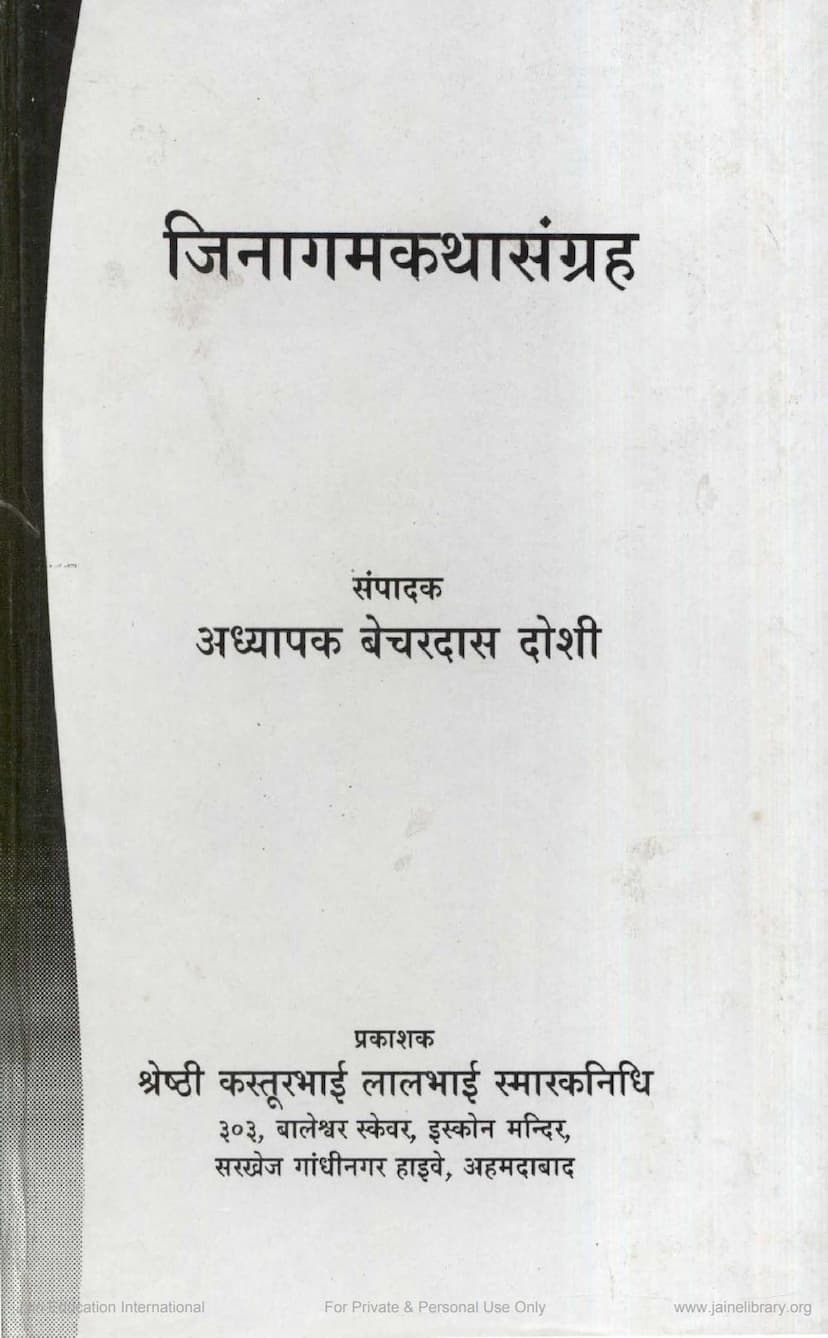Jinagam Katha Sangraha
Added to library: September 2, 2025

Summary
Summary of "Jinagam Katha Sangraha" by Bechardas Doshi
"Jinagam Katha Sangraha," edited by Adhyapak Bechardas Doshi and published by Kasturbhai Lalbhai Smarak Nidhi, Ahmedabad, is a valuable collection of Jain narratives intended to make the study of Prakrit language more accessible. The book, published in 2008, aims to bridge the gap for students of Ardhamagadhi by reprinting and enhancing a previously scarce work.
Key Features and Content:
-
Purpose: The primary goal of this collection is to facilitate the learning of Prakrit, specifically the "Arsha Prakrit" found in Jain Agamas. It achieves this by presenting engaging and instructive stories along with comprehensive supplementary material.
-
Language: While the stories are presented in Prakrit, the explanations, annotations (commentaries), and the Prakrit grammar are provided in Hindi. This bilingual approach ensures that a wider audience, including those with a basic understanding of Sanskrit, can access and benefit from the text.
-
Content Structure: The book is structured to provide a holistic learning experience. It includes:
- Prakrit Language Introduction: A section dedicated to introducing the fundamental aspects of Prakrit, addressing its relationship with Sanskrit, the diversity within Prakrit itself (including Arsha Prakrit and Pali), and explanations of its grammatical features.
- Stories (Katha Sangraha): A collection of 32 narratives drawn from various Jain texts, including the Sthananga Sutra, Vasu-dev-hindee, Uvasaga-dasao, Shataka, Vajjalagam, Upadesapada, Niryavali Sutra, and others. These stories are chosen for their educational and enjoyable content, offering insights into Jain philosophy, ethics, and historical narratives.
- Commentaries (Tippaniyan): Detailed annotations for difficult words and phrases within the stories, aiding comprehension.
- Prakrit Vocabulary (Kosh): A glossary providing meanings and etymological explanations for various Prakrit words.
- Prakrit Grammar: A concise yet comprehensive grammar of Prakrit, covering aspects like:
- Vowel Usage: Explaining the vowels used and their modifications.
- Consonant Usage: Detailing the rules for consonant pronunciation and transformation.
- Sandhi (Vowel and Consonant): Explaining the rules of phonetic joining.
- Noun Declensions: Providing paradigms for various noun declensions (masculine, feminine, neuter) in different cases.
- Pronoun and Numeral Conjugations: Presenting the forms of pronouns and numbers.
- Verb Conjugations: Outlining the conjugation patterns of common verbs in different tenses.
- Krdanta (Participles): Explaining the formation and usage of participles.
-
Editorial Contributions: Editor Bechardas Doshi, a renowned scholar of Prakrit grammar and literature, meticulously selected and compiled the stories. His extensive research involved drawing material from various original Jain texts. The publication was also supported by the Sharda-ben Chimanbhai Educational Research Center.
-
Dedication: The book is dedicated to the editor's parents, acknowledging an unpayable debt of gratitude.
-
Publisher's Note: The publisher highlights the long-standing demand for the original "Prakrit Katha Sangraha" published by Gujarat Vidyapeeth, which had become unavailable. They explain the decision to re-edit and expand it to make it more beneficial for learners. They also mention the delay in publication due to the involvement of Gujarat Vidyapeeth in the freedom struggle.
-
Editor's Foreword (Prastavana): Bechardas Doshi elaborates on his intention to simplify Prakrit study through this collection. He emphasizes that the stories and grammatical explanations are presented in Hindi to facilitate understanding. He also discusses the origin of the collected material from original Jain sources and the pedagogical approach taken in providing commentaries and vocabulary to aid in understanding word evolution and meaning. He expresses gratitude to the original authors and editors of the texts from which the material was gathered and acknowledges the assistance of Muni Amarchandji in refining the Hindi used in the book. He also thanks Gopalbhai Jivabhai Patel for reviewing the initial proofs.
Overall Significance:
"Jinagam Katha Sangraha" serves as a crucial resource for anyone interested in the Jain Agamas and the Prakrit language. By combining engaging narratives with detailed linguistic and grammatical explanations, it makes a significant contribution to the preservation and dissemination of Jain literary heritage and facilitates scholarly engagement with this important ancient Indian language. The book's comprehensive approach, from introducing the language to providing extensive grammatical details and historical context, makes it an indispensable tool for students and researchers alike.